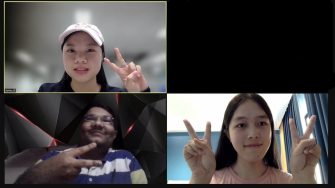A team from UNSW have qualified for the World Finals of the prestigious International Collegiate Programming Contest (ICPC) which are scheduled to be held in Bangladesh in November.
Students Sylvia Huang, Adith Sanjeeve and Tsingying Xu, calling themselves Celestial Interface, finished first in the South Pacific Regional Contest in December to book their place in the finals.
The International Collegiate Programming Contest has been running since 1977 and brings together many of the finest computer science, engineering and mathematics students from leading universities all over the world.
In this competition, teams of three compete to design and implement algorithms for a variety of challenging problems within five hours. This requires not only expertise in algorithms and programming, but also creative thinking and the ability to solve problems and code accurately under time pressure. Furthermore, the three team members traditionally use only one computer, so it is crucial that the participants communicate well in order to efficiently allocate the use of the keyboard.
To reach the World Finals, teams had to excel in both the South Pacific Divisional Contest on 16th October 2021 and the South Pacific Regional Contest on 11th December 2021. Due to COVID-19 restrictions, both contests were held in a mixed format, which saw some teams participate from live sites at their universities while others competed remotely, including from overseas.
28 teams of UNSW students took part in the Divisional contest. Competing against teams from universities across Australia and New Zealand, our students performed admirably and took four of the top seven places. Celestial Interface, Runtime Terror and Optimal Brain Damage qualified to the regional finals. An honourable mention goes to the 7th placed team Dense Table (Isaiah Iliffe, Zhiyuan Qi, Laeeque Jamdar).
In all, fifteen teams progressed to the regional finals, where they faced a much more difficult problem set. Celestial Interface came first, solving 10 of the 12 problems. They were the only team to solve the extremely difficult problems B and D.
Runtime Terror (Yifan He, Ali Khosravi and Dallas Yan) came second with 9 problems, and were the only team to solve the tricky geometry problem K.
Optimal Brain Damage (Nathan Lee, Jeffrey Yang and Kevin Zhu) came fourth, solving 7 problems. They were the first team to solve problem E.

